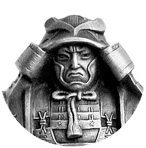A Great Teacher
Samurai Philosophy
-
The samurai had always been preparing himself for meeting the great teachers while being careful not to accidentally disturb them until he was ready to receive their wisdom. He bowed to the stones and silently asked for permission to approach them. Then he sat on his mat made of light rice straw and put his favourite long sword, decorated with his family coat of arms, in front of him. Its immaculate scarlet sheath was made of strong, shining skate skin and covered with many round even buds.
The samurai calmed his breath and focused his attention on the first oblong stone covered in emerald-colored moss, then shifted his gaze to the second stone and peered into its every crack.
After a while, he let his consciousness travel along the invisible path among the stones, narrowing and channeling its flow and locking in only on the stones. Soon, everything else around him ceased to exist.
A while later, the stones disappeared as the samurai was absorbed in dissociated solitude. His consciousness focused on only one, bare as nerve, thing – his inner self. The samurai saw himself many years ago, sitting in front of the stones with his father for the first time and he felt like a tiny blade of dry grass caught in a dizzying vortex. His focused consciousness revolving around the stones created an unfamiliar, nauseous feeling, as if everything that was evil in him was about to climb up his esophagus and be exposed to the whole world. He had never forgotten his father’s words,“If something throws you off balance, do it until you find balance… Every day, fight and purify yourself. Try to see yourself from others’ eyes, notice everything and draw your own conclusions.Make a constant effort of will – that is the only way forward.”
In his mind’s eye, he saw the most defining moments of his life. He remembered how his father had once pointed to a pile of firewood that the servants had prepared for the castle and told him, “You must carry them all to the shed and arrange them in neat rows until the next full moon.”In the small boy’s eyes, the pile was enormous mountain; it seemed like an impossible chore.“What if I can’t live up to my father’s task?” he remembered thinking. His father had absolute authority and betraying his trust by proving unworthy would have been the greatest shame. An eerie chill had spread throughout the boy’s chest, his heart had started pounding and his blood rushed to his head. It was a moment that felt like an eternity. By the age of five, he had already realized that a samurai must not consider anything impossible or show any sign of weakness. At times when life had seemed unbearable, he repeated the saying inscribed on the wall of their family temple, “A samurai may die, that is all. However, while he is alive, he must do his duty.”So, he had bowed to his father who did not seem to have noticed his son’s confusion, and headed off.
His mentor had taught him that the way to the highest peak consists of tiny steps, and each of those steps requires willpower every day. With that in mind, he had divided the pile into equal parts and did not rest until the next part of the task was finished. The only thing he had feared was not making the deadline. Day after day, he had carried the firewood. Heavy, knotty logs kept slipping out of his small, feeble hands, leaving behind painful splinters. He would take out the splinters and continue with his task. At the end of each day, his back had ached and his arms... read further in the book
Back to the Blog
This is part of a chapter from Samurai: Legend by A. R. Berg


